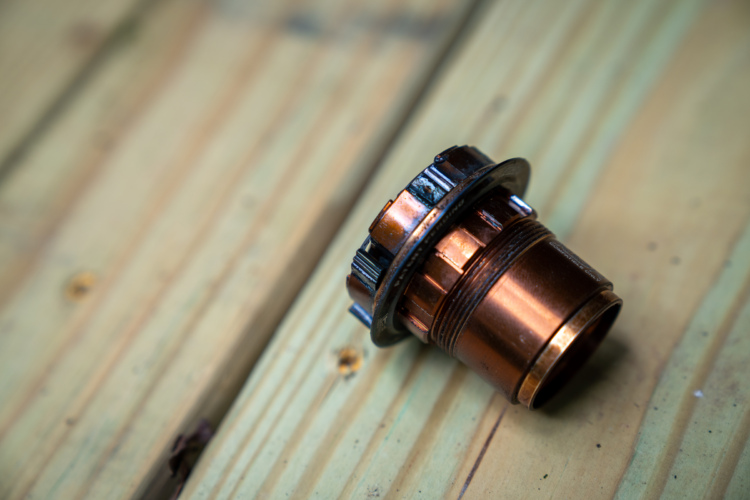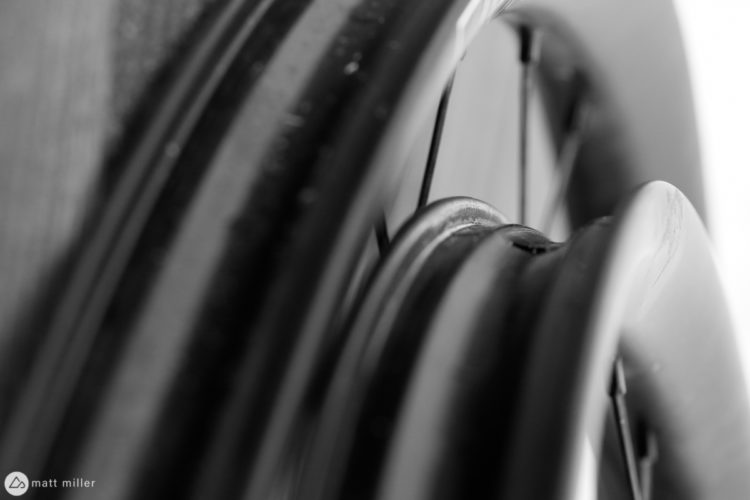Released earlier this year, Industry Nine’s Solix hub is the heart of two new wheel systems. Firstly, replacing the Torch in their road and gravel lineup, and secondly as a lightweight XC and trail option, available as either hub only, or as part of several complete wheel systems, including the I9 Solix M Trail 285 wheels I’ve been testing over the summer.

Solix M Trail 285 wheel specs
- 0.59º engagement
- 24 direct-thread aluminum spokes
- Centerlock rotors only
- HG/MS/XD freehub bodies
- 28mm internal rim width, aluminum alloy rims
- Boost 148/Super Boost 157mm width
- 29″ only
- Weight: 1500g pair
- Price: $1,410
- Buy from Industry Nine
The Solix is positioned as a lighter weight alternative to the Hydra, coming in at a similar price point. The hub diameter is much smaller, and therefore lighter. That smaller packaging means a smaller ratchet ring and only 5 pawls rather than six. This results in slightly fewer points of engagement at 605 points and 0.59º, rather than the 0.52º of the Hydra, though I don’t think anyone is going to lose much sleep over those 0.07º degrees. Industry Nine say they’ve matched hub shell bearings and increased the capacity of their freehub bearings, which in theory means they should last longer and make for a stiffer hub.

Smaller packaging also means that the Solix hubs are Centerlock disc mount only, with no six-bolt option. For mountain options, Solix comes in Boost 148mm or Super Boost 157mm spacing and 24h or 28h J-bend configurations. The regular array of twelve anodized colors is available, in all three common freehub bodies, and with an option for steel or ceramic bearings. All fully built wheelset options use Industry Nine’s direct-thread hub shells and straight-pull, one-piece machined aluminum spokes, assembled in-house in Asheville, North Carolina.
I tesed the M Trail 285 24h, designed for ‘XC to aggressive trail’, installed on my Santa Cruz Tallboy. This particular wheelset is built around the Solix, with 24 aluminum I9 straight pull spokes built around a lightweight aluminum rim. The rim is 28.0mm wide, and is designed for slightly narrower cross-country and trail tires, up to 2.5″ wide. The wheelset features an extra wide hollow bead wall which should increase pinch flat protection, and is covered by a two-year warranty against manufacturer defects.
Since Industry Nine custom builds all wheelsets in house, when choosing anything outside of stock black on black, you pretty much have free range of their gamut of colors, and can spec your build spoke by spoke, including valve stems. It makes for a nice way to truly customize your bike, and I felt like the green I chose compliments my Tallboy nicely.
The complete wheelset is priced at $1,410 fully built, and the price goes up the more colors you add. This particular wheelset weighs 824g for the rear, and 724g for front, for a combined total of 1548g.




Installation
Installing the wheels was relatively simple. I did have to find some Centerlock to six-bolt adapters for my rotors, but once I figured that out it was smooth sailing. My tires aired up with little drama, and setup was easy. The hubs spin freely with little drag out of the box, and the freehub makes a pleasing noise without being overly loud with that typical I9 buzz still, which some love, and others don’t.
Ride Quality
Being that the Industry Nine Solix M Trail 285 wheels were designed for ‘aggressive trail’ use, my Santa Cruz Tallboy seemed like a fitting bike to install them on. The impressively light weight of the wheels is noticeable compared to my 2000g Reserve carbon wheelset, making for a slightly more sprightly feel both off the line and on technical trails.
While feeling light, they also introduce a little extra compliance, as you would expect from a light-duty wheelset, though not so much that they deliver a vague ride feel. The Solix M Trail wheels feel plenty stiff and solid, with just a slightly damped feel. I ran the wheels for around 500km and found them to be quite versatile, and the high engagement of the freehub is particularly nice when negotiating technical climbs and needing to ratchet over things or put in a quick pedal stroke, as we often need to on the North Shore.
I ran these wheels with both my regular setup of Vittoria Agarro 2.35″ and Specialized Ground Control/Fast trak 2.35″ tubeless tires with a Vittoria Air Liner Light insert on the rear. The Vittoria insert provides a little additional puncture protection, but not much. That said, the tires held up well and produced a decent rounded profile on the rim without any squirmy feeling or unpredictability. The 2.35″ width fits well with the 28mm internal width of the rim.

Reliability and Repairs
The wheels were overall relatively reliable, save for one issue — a flat spot. I have a fundamental problem with aluminum rims, and that’s that I’m a hack that lives on the North Shore. Around halfway through my testing period, I hit a rock somewhere that slightly dinged the rim and flat-spotted it. This resulted in a very small fold in the inner bed of the rim next to a spoke hole, which made the rim tape leak. I re-taped the rim, but eventually it leaked again. The flat spot was terminal. My understanding of Industry Nine’s warranty policy is that the rims “are not warrantied for impact or crash damage,” which means I’d likely have to pay for a new rim and for it to be re-laced.

Outside of the flat spot, the wheels didn’t put a foot wrong, and in between the tape leaking for a second time, I managed to do a week or two of riding plus complete the first five days of BC Bike Race before I had to fit a spare wheel. Despite racing hard for five days — and believe me, I was pushing hard — I didn’t damage the rim again, which leads me to believe that it was hopefully an isolated incident. Some people should stick to carbon wheels – I think I’m one of those people. It’s also worth noting that BC has particularly rough terrain, and what’s considered ‘aggressive trail’ here could be considered enduro elsewhere. Most people are likely to have smoother trails, and thus better luck with wheels than me.
Though I did flat-spot the rear rim, I did not puncture. Wider bead walls in recent times have resulted in rims that make it a lot harder to puncture, and despite hearing myself bottom the rim out a number of times, thankfully I never did get a flat tire.
Despite the funky-looking spokes, the wheels true up exactly the same as any other wheel with a regular spoke wrench. I did have to do a little truing after my flat spot, but it held well enough.
After a good amount of abuse, I’m happy to report the hub bearings held up well, which is not something that can always be said about Hydra hubs, as I reported back in 2021 on the Enduro 305 wheels. Servicing is straightforward, and the same as most other hubs – the end caps pull off, the freehub slides off giving access to the pawls, springs, and ratchet ring. After a few months of use, the freehub grease was a little dirty, but nothing looked out of place, and the the bearings felt good.




Pros and cons of the Industry Nine Solix M Trail 285 wheelset
Pros
- Light weight
- High engagement
- Good pinch flat protection
- Very customizable
Cons
- Expensive
- Aluminum rims can flat spot/ding
Bottom line
The Industry Nine Solix M Trail 285 24 wheelset is not cheap by any stretch, but the quality and design intent is obvious. The Solix hubs tick like a Swiss watch, and are a beautifully engineered item. The weight for an aluminum wheelset is impressively low, and they handle well, but they are susceptible to the same pitfalls as any other alloy wheelset, which is that the rims can be damaged in the hands of an unruly rider.
Most riders looking for a lightweight trail or aggressive XC wheelset will be well served by these, particularly if their home trails and pilot are more forgiving than those in BC, and myself, though there’s no getting away from the price tag. If you want the bling and you’re easy on wheels, they’re a solid choice. If you’re a wheel destroyer, my advice is to spend another $1000 and go carbon, or spend a smidge more on a less blingy carbon wheelset like the Reserve 30 SL or 28 XC wheelsets.





















1 Comments
Sep 16, 2024